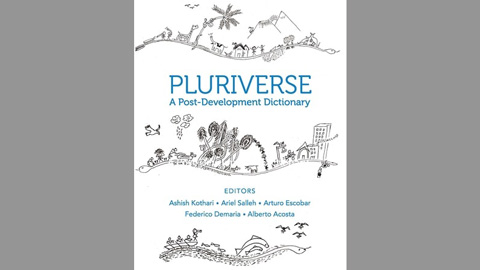
The publication, co-ordinated by ICTA-UAB researcher Feredico Demaria with other international experts, presents a large inventory of alternative practices to "development" as a predominant way of life in today's society.
The current planetary crisis has taken on a civilizational dimension. Never before have so many crucial aspects of life failed simultaneously, and never before have expectations about the future been so uncertain. Against this background, it is necessary to set aside the prevailing concept of "development" as progress and look for alternatives that respect and nurture life on Earth. This is the main idea that has led ICTA-UAB researcher Federico Demaria to publish the book "Pluriverse: A Post-Development Dictionary", coordinated with researchers Ashish Kothari, Ariel Salleh, Arturo Escobar and Alberto Acosta.
Given the dominant Western development model adopted by people across the world, the new book "Pluriverse: A Post-Development Dictionary" presents a stimulating collection of over 100 essays on transformative alternatives to the currently dominant processes of globalized development, including its structural roots in modernity, capitalism, state domination, and masculinist values.
In the post-development imagination, 'development' would no longer be the organizing principle of social life. The book presents worldviews and practices from around the world in a collective search for an ecologically wise and socially just world. "At a time in which development is unquestionable, there are many peoples of the world challenging it and living in a different way", explains Federico Demaria.
It also offers critical essays on a number of false solutions that those in power are proposing in an attempt to 'greenwash' development. "The book is a criticism of the reformist proposals that come from the 1980s such as sustainable development that, after three decades, we can say has failed in its objective of promoting the sustainability of life", adds Demaria.
Pluriverse speaks to a confluence of economic, socio-political, cultural, and ecological visions. It is a broad transcultural compilation of concrete concepts, worldviews, and practices from around the world, challenging the modernist ontology of universalism in favour of a multiplicity of possible worlds. "Development is the current universe, and the book presents a pluriverse", the author says. Therefore, the book is intended to re-politicize the ongoing debate over socio-ecological transformation by providing a guidance to its multi-dimensionality.
The book follows the structure of an encyclopedia, with short 1000-word entries for each of the key terms. It refers to concepts such as conviviality, decline, direct democracy or social ecology. "Some of them are not known and we should incorporate them into our language, a vocabulary to discover how we want to live", Demaria points out. The 120+ contributors to the volume include activists, academics, and practitioners, with a wealth of experience in their respective fields of engagement such as Vandana Shiva, Serge Latouche, Wolfgang Sachs, Silvia Federici, Nnimmo Bassey, Gustavo Esteva, Katherine Gibson, Maristella Svampa and many more.






